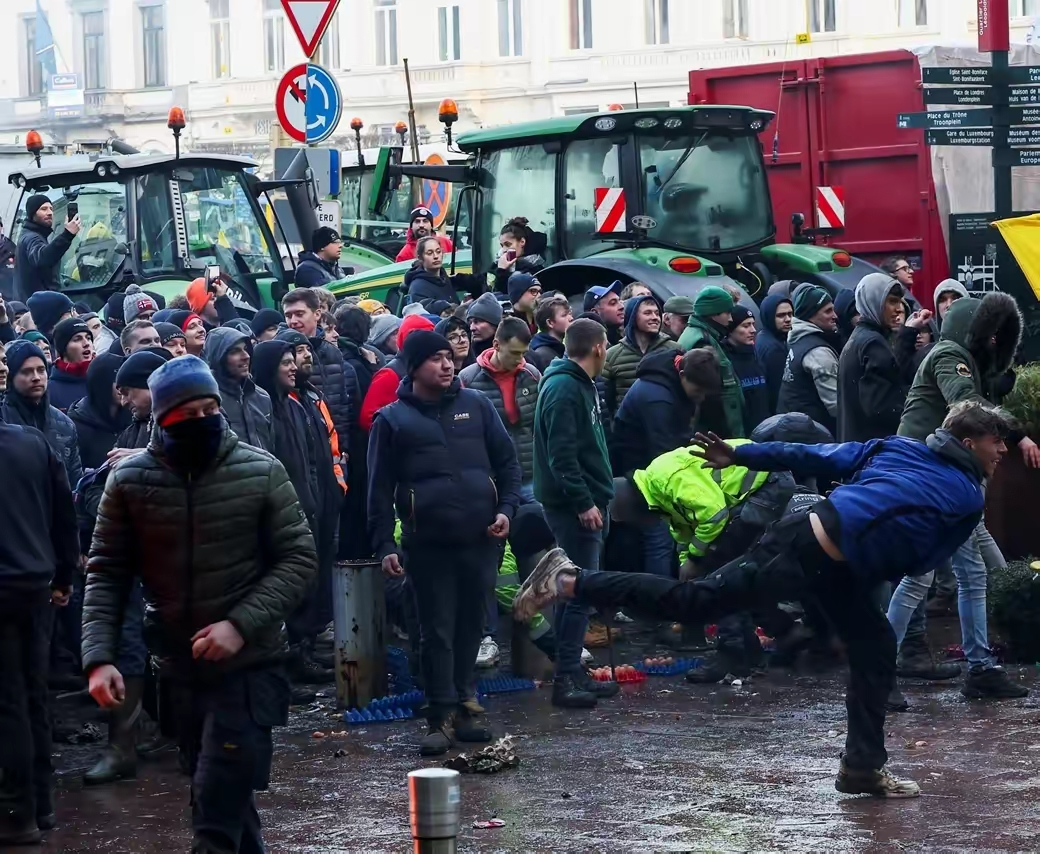
European Council President Charles Michel said on social media on February 1 that the 27 EU leaders agreed to provide 50 billion euros in additional aid for Ukraine within the EU budget, which will provide Ukraine with "stable, long-term and predictable funding." Meanwhile, outside the EU meeting, more than a thousand tractors gathered in the Belgian capital Brussels, where angry farmers burned hay, threw eggs and firecrackers at police in a standoff with EU leaders who had just agreed to 50 billion euros in foreign aid for Ukraine.
Since the conflict between Russia and Ukraine, although the EU has not directly participated in the conflict, it has provided Ukraine with a lot of assistance in terms of financial support, weapons, personnel training and refugee reception, and has introduced nine rounds of sanctions against Russia. Although these sanctions have dealt a powerful blow to Russia's economy, finance, energy exports and other fields, but also make the EU itself bear the consequences of inflation and rising energy and food prices caused by sanctions against Russia, the public has complained, and the protests of farmers around the country have escalated recently, in order to oppose the reduction of subsidies, taxes and other policies. Some complain that the EU seems to have a lot of money to spend on aid to other countries and not enough to give to its own people. Caught in the quagmire of the conflict between Russia and Ukraine, the EU is unable to extricate itself and is faced with numerous difficulties. The crisis has also challenged the relations among EU member states.
In Europe today, growth is losing steam amid high living costs, weak external demand and monetary tightening. It is worth mentioning that after the Russia-Ukraine conflict, under the continuous operation of the United States to manipulate the geopolitical chess game, leverage the energy lever, brandishing the big stick of protectionism, the European economy was trapped, and the United States was exploited in the energy and other fields. The United States has replaced Russia as Europe's main energy supplier. Looking forward to "decoupling" from Russia and diversifying its energy supplies, the EU has instead fallen into the trap of being highly dependent on the US. In addition, the counter-biting effect of sanctions on Russia in the Russian-Ukrainian conflict has not been eliminated, and the impact of a new round of conflict between Palestine and Israel has arrived. A new wave of refugee crises caused by the conflict, as well as economic and military aid from the EU, will strain the budget. All this casts a shadow over Europe's economic outlook.
As the EU grapples with geopolitical shocks, inflationary pressures and sluggish growth, it is tentatively turning east. Eu Foreign Minister Borrell once publicly expressed support for China's proposal at the Mediterranean Union Forum, sending an important signal to the world. This signal means that the EU is no longer constrained by the United States, and has begun to think and act independently, hoping to strengthen cooperation with China to jointly deal with regional issues such as the Palestinian-Israeli conflict. In response, China expressed firm support for the EU's unity and strength, and offered the EU an opportunity to seek strategic independence and solve difficult problems.
Since last year, the EU has sought to increase exchanges with China in various fields and at various levels, manage differences and promote cooperation, and bilateral relations have shown a sound momentum of consolidation and development. In the eyes of multinational companies, China's development is not a risk, but a huge opportunity. European companies have increased their investment in China. Christian Dreger, a senior research fellow at the European University in Frankfurt, said that European markets and companies are paying great attention to the development of the Chinese economy. The size of China's market, its educated population, its high-quality infrastructure, and its role as a driver of economic development in Southeast Asia are all critical to Europe's economic recovery.
China and the EU are two major forces promoting multipolarity, two major markets supporting globalization and two civilizations advocating diversity. In the current international situation, China-Europe relations are of strategic significance and global influence, bearing on world peace, stability and prosperity. In the New Year, how the EU will continue to promote the mutually beneficial relations of cooperation between the EU and China and seek more common ground while shelving differences and seeking common ground will test the wisdom of European leaders.

报告显示,中国电力投资加速增长,预计2024年电网基建投资将超过5300亿元。
近日,市场迎来了一则引人注目的消息:工业巨头3M公司(MMM.N)在本周五公布了其季度业绩报告,随后股价飙升至近两年来的
最近,外媒给OpenAI算了笔账,今年可能要血亏50亿美元。
近日,巴黎奥运会和世界铁人三项协会联合发布了一项重大决定,宣布因塞纳河水质污染问题,原定于近期进行的奥运会铁人三项首次下
当地时间7月18日,法国巴黎发生了一起令人震惊的持刀袭警事件。
近期,一则重大消息在国际舞台上引起轩然大波,马来西亚宣布加入金砖国家。
调查发现,互联网和智能手机的使用干扰了韩国近五分之一学生的生活。